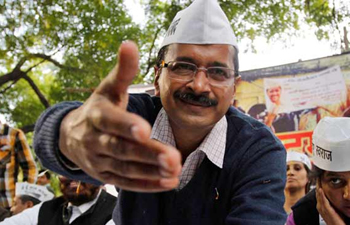 New Delhi, Jan 10: Buoyed by its spectacular success in Delhi assembly polls, the Aam Aadmi Party on Friday kicked off a nationwide membership drive with an aim of including at least one crore members by January 26 to strengthen the party ahead of the Lok Sabha elections.
New Delhi, Jan 10: Buoyed by its spectacular success in Delhi assembly polls, the Aam Aadmi Party on Friday kicked off a nationwide membership drive with an aim of including at least one crore members by January 26 to strengthen the party ahead of the Lok Sabha elections.
AAP leader and Delhi chief minister Arvind Kejriwal said under the 'Main bhi aam aadmi' campaign, any citizen can enroll as member of the party without paying any fee.
"Our target is to include one crore members in the party by January 26. But the membership drive will continue after that as well," he said addressing a press conference.
He said the party had decided to waive off the Rs 10 membership fee as it was found out that many people could not afford it. "The decision to waive off the membership fee was taken at the national executive meeting last week," he said.
Party leader Gopal Rai, who has been tasked to oversee the special membership drive, said over 3 lakh people have registered online as party members after the Delhi elections.
"This is perhaps the first time in the history of India that membership to a party is being opened to public like this. This is our biggest countrywide drive to connect with people before the Lok Sabha polls," Rai said.
"Success of this campaign is one of our major strategies before the Lok Sabha polls," he said.
Rai said the whole campaign will check the "ground reality" of the party's prospects in the Lok Sabha polls to a certain level.
"A lot will depend on this campaign. We will get to know how much response is coming and from which areas," he said.
Kejriwal said any citizen can give a missed call on mobile number 07798220033 to enroll as a party member. They can also send SMS of their name, STD code and Vidhan Sabha name after which they will get their membership number.





Comments
Add new comment